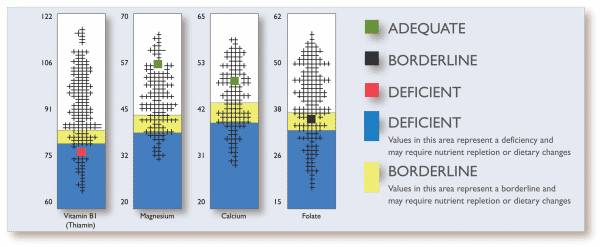The future of personalized wellness starts here.
At Well Medical Arts we believe that inner health is the key to outer beauty. We have sourced a variety of diagnostic tests to help you find your individualized key to operating at peak performance.
Micronutrient Testing with SpectraCell
Get a truer picture of where you stand nutritionally.
SpectraCell’s Micronutrient tests measure the function of 35 nutritional components including vitamins, antioxidants, minerals and amino acids within our white blood cells. Scientific evidence shows us that analyzing the white blood cells gives us the most accurate analysis of a body’s deficiencies.
Overwhelming scientific evidence confirms that vitamin deficiencies are associated with disease processes and the overall condition of one’s health. Vitamin, mineral and antioxidant deficiencies have been shown to suppress immune function and contribute to chronic degenerative processes. The micronutrient tests measures how micronutrients are actually functioning within your white blood cells.
Functional Intracellular Analysis (FIA) offers a unique way to scientifically assess the intracellular requirements of micronutrients that play an important role in overall health and wellness. The tests measure the biochemical function of vitamins, minerals, amino acids and antioxidants, providing a powerful clinical assessment, through a simple blood test.
Learn more about the leader in nutritional testing at: www.spectracell.com

Telomere testing
Telomere testing reveals a window to your cellular age.
Telomeres are sections of genetic material at the end of each chromosome whose primary function is to prevent chromosomal “fraying” when a cell replicates. As a cell ages, its telomeres become shorter. Eventually, the telomeres become too short to allow cell replication, the cell stops dividing and will ultimately die – a normal biological process. The Telomere Test can determine the length of a patient’s telomeres in relation to the patient’s age. Age adjusted telomere length is the best method to date to assess biological age using structural analysis of chromosomal change in the telomere. Serial evaluation of telomere length is an indicator of how rapidly one ages relative to a normal population. Therapies directed at slowing the loss of telomere length may slow aging and age-related diseases. Learn more about Telomere testing at: https://www.spectracell.com/clinicians/products/telomere-testing/
Lipoprotein Particle Profile
Do Cholesterol numbers really assess cardiovascular risk? LipoProtein particle numbers tell the story.
Up to 50 percent of those who have suffered heart attacks had “normal” cholesterol numbers. How can the large discrepancy between accurate diagnosis and standard cholesterol testing be prevented? Simply by testing the LDL (low density lipoprotein) particle numbers using the Lipoprotein Particle Profile™ (LPP™) from SpectraCell Laboratories.
Cholesterol testing has historically been used as the standard indicator for cardiovascular disease classified as HDL (good) or LDL (bad). However, it is actually the lipoprotein particles that carry the cholesterol throughout the body, not necessarily the cholesterol within them, that are responsible for key steps in plaque production and the resulting development of cardiovascular disease.
Approximately 50 percent of people suffering from heart attacks have shown “normal” cholesterol numbers (NHLBI – The National Heart, Lung, and Blood Institute).
Now there is an advanced cholesterol testing technology which accurately measures both the density and number of lipoprotein particles. This test is the Lipoprotein Particle Profile.
Learn more about the LPP test here: https://www.spectracell.com/clinicians/products/lpp/
See a sample report here: https://www.spectracell.com/media/uploaded/l/0e2367501_1376061396_lppsamplereport413.pdf

